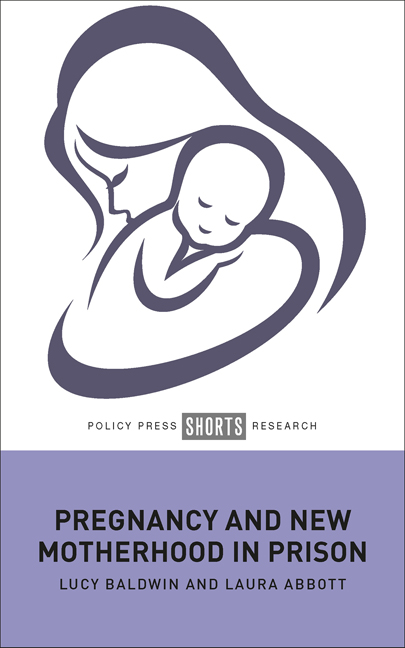Book contents
- Frontmatter
- Dedication
- Contents
- Acknowledgements
- ONE Context and landscape of pregnancy and new motherhood in prison
- TWO How we came to be here: 100 years of criminalised motherhood
- THREE The ‘journey’ to incarcerated motherhood
- FOUR Motherhood confined
- FIVE The persisting pain of incarcerated pregnancy and new motherhood
- SIX Personal experiences of pregnancy and motherhood in prison and the value of the voluntary sector in challenging the system
- SEVEN ‘Learning lessons’: discussion, concluding thoughts and recommendations
- Notes
- References
- Index
SEVEN - ‘Learning lessons’: discussion, concluding thoughts and recommendations
Published online by Cambridge University Press: 03 April 2024
- Frontmatter
- Dedication
- Contents
- Acknowledgements
- ONE Context and landscape of pregnancy and new motherhood in prison
- TWO How we came to be here: 100 years of criminalised motherhood
- THREE The ‘journey’ to incarcerated motherhood
- FOUR Motherhood confined
- FIVE The persisting pain of incarcerated pregnancy and new motherhood
- SIX Personal experiences of pregnancy and motherhood in prison and the value of the voluntary sector in challenging the system
- SEVEN ‘Learning lessons’: discussion, concluding thoughts and recommendations
- Notes
- References
- Index
Summary
‘It’s not rocket science, don’t send pregnant women to prison for shoplifting.’
Beth, 2017Introduction
All mothers take with them a legacy from their time in prison and/or a prison MBU. Sometimes that legacy is positive; for example, some mothers may have benefited from a safer and intentionally supportive space to begin life as a mother than they might otherwise have had (though most often not without some cost), but often there are negative and complex consequences too. This evidence-based volume has revealed and unpicked some of those realities.
We, the authors, have both undertaken multiple research projects that inform our writing here, but the bulk of the evidence for this book came from two main studies, Motherhood Challenged (Baldwin, 2021a) and The Incarcerated Pregnancy (Abbott, 2018). We acknowledge that since our research was undertaken there is more of an appetite and motivation for positive change (in part, stimulated and assisted by our research). This change, although coming on the back of the aforementioned tragedies, is welcome.
This chapter incorporates a reflective summary of the takeaway messages of the book while re-stating the current landscape and present commitment to change. Drawing on our own thoughts, research and the women’s voices, we conclude with 21 recommendations, which, if implemented, we feel would go some way towards minimising harm and improving outcomes for pregnant and new mothers in and after prison.
Appetite for change
It is positive that the Ministry of Justice has committed to improving conditions for mothers and their babies, and that they are heeding advice and guidance from experts like the authors, charitable organisations like Birth Companions and activists like the gender justice pressure group Level Up. We echo the recommendations we have made previously, and those outlined in the recent reviews. The Trowler review and the Review of Operational Policy on Pregnancy, Mother and Baby Units and Maternal Separation are important and influential reports that shine a light on the current provisions made for mothers and babies, where the gaps in provision are and how best to improve responses.
- Type
- Chapter
- Information
- Pregnancy and New Motherhood in Prison , pp. 145 - 170Publisher: Bristol University PressPrint publication year: 2023

